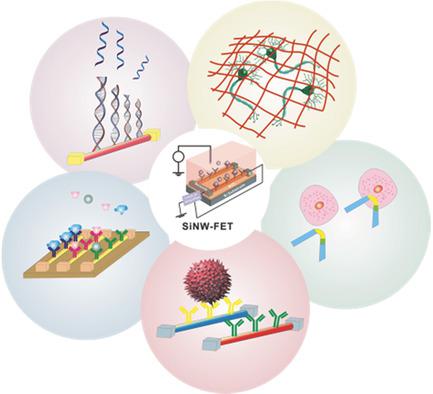当前位置:
X-MOL 学术
›
Small Methods
›
论文详情
Our official English website, www.x-mol.net, welcomes your
feedback! (Note: you will need to create a separate account there.)
Advances in Nanowire Transistor‐Based Biosensors
Small Methods ( IF 10.7 ) Pub Date : 2018-02-22 , DOI: 10.1002/smtd.201700263 Qian Li 1, 2 , Na Lu 1 , Lihua Wang 2 , Chunhai Fan 2
Small Methods ( IF 10.7 ) Pub Date : 2018-02-22 , DOI: 10.1002/smtd.201700263 Qian Li 1, 2 , Na Lu 1 , Lihua Wang 2 , Chunhai Fan 2
Affiliation

|
Semiconducting nanowires (NWs) present new opportunities for developing electrical biosensors due to their inherent properties, including large surface‐to‐volume ratio, rapid signal response, configurability in electronic devices, and nanoscale footprint comparable to biomolecular and subcellular structures. Field‐effect transistors (FETs) based on silicon nanowires (SiNWs) have proven to be a powerful and versatile tool in the biomedical fields. Recent advances in SiNW‐FET biosensors, including fundamental aspects and working principles, preparation of nanowires, and surface functionalization, as well as applications in biological analysis and cellular investigation, are discussed here. It is envisioned that nano‐FET devices will have several applications in fields such as clinical diagnosis, point‐of‐care testing, and screening for early disease.
中文翻译:

基于纳米线晶体管的生物传感器的进展
半导体纳米线(NWs)由于其固有的特性(包括大的体积比,快速的信号响应,电子设备的可配置性以及可与生物分子和亚细胞结构媲美的纳米级足迹),为开发电生物传感器提供了新的机遇。在生物医学领域,基于硅纳米线(SiNW)的场效应晶体管(FET)已被证明是功能强大且用途广泛的工具。本文讨论了SiNW-FET生物传感器的最新进展,包括基本方面和工作原理,纳米线的制备,表面功能化以及在生物学分析和细胞研究中的应用。可以预见,nano-FET器件将在临床诊断,即时检验和早期疾病筛查等领域具有多种应用。
更新日期:2018-02-22
中文翻译:

基于纳米线晶体管的生物传感器的进展
半导体纳米线(NWs)由于其固有的特性(包括大的体积比,快速的信号响应,电子设备的可配置性以及可与生物分子和亚细胞结构媲美的纳米级足迹),为开发电生物传感器提供了新的机遇。在生物医学领域,基于硅纳米线(SiNW)的场效应晶体管(FET)已被证明是功能强大且用途广泛的工具。本文讨论了SiNW-FET生物传感器的最新进展,包括基本方面和工作原理,纳米线的制备,表面功能化以及在生物学分析和细胞研究中的应用。可以预见,nano-FET器件将在临床诊断,即时检验和早期疾病筛查等领域具有多种应用。











































 京公网安备 11010802027423号
京公网安备 11010802027423号